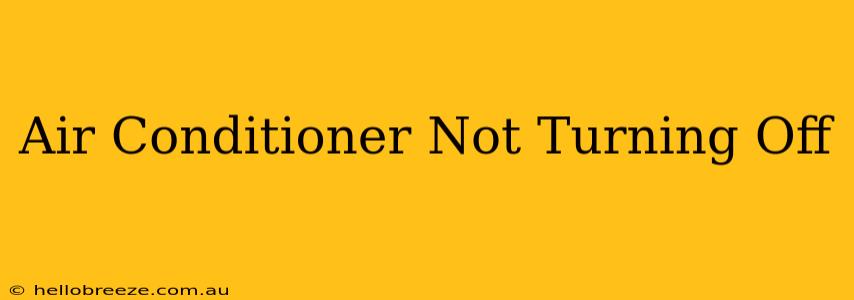Is your air conditioner stuck on, refusing to turn off even when you've adjusted the thermostat? This frustrating problem can stem from several sources, from simple user errors to more complex mechanical issues. This guide will walk you through troubleshooting steps to diagnose and fix your AC unit, saving you money and discomfort.
Common Reasons Why Your Air Conditioner Stays On
Before calling a repair technician, let's explore the most frequent culprits behind a perpetually running AC:
1. Thermostat Issues: The Usual Suspect
- Incorrect Settings: Double-check your thermostat settings. Make sure it's set to the desired temperature and not accidentally stuck in "ON" or "COOL" mode. A faulty thermostat can also cause this, preventing the unit from receiving the "off" signal. Try replacing the batteries (if applicable) as a first step.
- Dirty Thermostat: Dust and grime can interfere with the thermostat's sensors, leading to inaccurate readings and malfunction. Carefully clean the thermostat with a soft brush or compressed air.
- Faulty Thermostat: If cleaning doesn't solve the problem, the thermostat itself might be malfunctioning. Consider replacing it with a new one; many are easily interchangeable.
2. Airflow Problems: Obstructed Pathways
- Blocked Vents: Check all vents in your home to ensure nothing is obstructing the airflow. Furniture, curtains, or even accumulated dust can restrict airflow, forcing your AC to run continuously to maintain the desired temperature.
- Dirty Air Filter: A clogged air filter restricts airflow, leading to overworking and continuous operation of your AC unit. Regularly replace or clean your air filter according to the manufacturer's recommendations. This is crucial for maintaining efficiency and preventing premature wear.
- Frozen Evaporator Coil: Restricted airflow can cause ice to build up on the evaporator coil, further restricting airflow and causing the unit to run constantly. If you suspect a frozen coil, turn off the AC and allow it to thaw before attempting to troubleshoot further. This often requires professional attention.
3. Electrical Malfunctions: Beyond the Thermostat
- Wiring Issues: Problems with the wiring connecting the AC unit to the power supply or thermostat can lead to continuous operation. This is a potentially dangerous problem and should only be addressed by a qualified electrician.
- Capacitor Problems: The capacitor in your AC unit helps start the compressor. A faulty capacitor can prevent the compressor from turning off, resulting in continuous running. Again, this requires professional attention.
- Compressor Problems: A malfunctioning compressor is a significant issue that often requires professional repair or replacement. A constantly running compressor indicates a potential serious fault and should be checked by an HVAC technician.
4. Refrigerant Leaks: A More Serious Concern
A refrigerant leak is a serious problem that requires immediate professional attention. Low refrigerant levels force the system to run continuously, trying to compensate for the loss of cooling capacity. This can also lead to damage to other components of the system.
When to Call a Professional
While many issues can be resolved through simple troubleshooting, some problems require the expertise of a qualified HVAC technician. Call a professional if:
- You suspect a refrigerant leak.
- You notice unusual noises or smells coming from the unit.
- The problem persists after trying basic troubleshooting steps.
- You are uncomfortable working with electrical components.
Ignoring a persistent problem can lead to further damage and increased repair costs in the future. Regular maintenance, including filter changes and professional inspections, can help prevent many of these issues from arising.
Remember to always prioritize safety when troubleshooting your AC unit. If you are unsure about any step, contact a qualified technician to avoid potential hazards.

